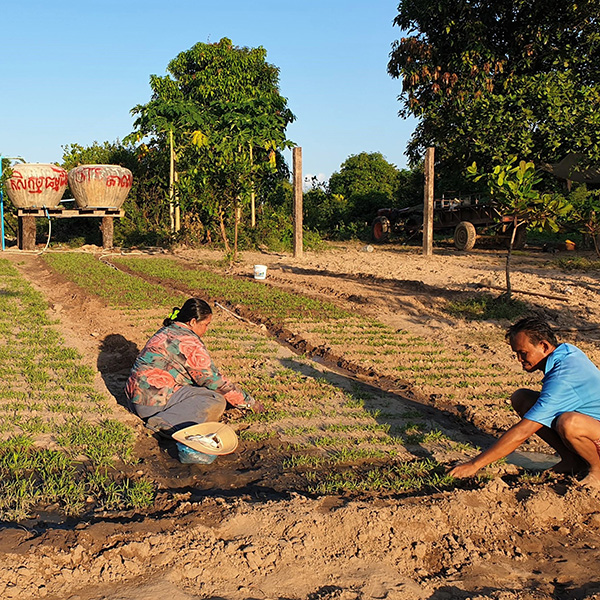Stories of Change

Kimsour and Samnang working on their farm.
Planting the (climate adaptive) seeds to success in Cambodia!
Em Kimsour, 38, lives in northern Cambodia. She has four children between 4 and 13 years old with her husband, Ros Samnang, 41. When we first met Kimsour and her family in 2017, they were struggling to make ends meet. They relied on subsistence farming and Kimsour’s earnings of less than $6 a day from selling rice porridge.
Kimsour and Samnang didn’t know how to manage their plot of land productively. They were only growing rice, and they didn’t have enough water or fertilizer. Even with the income from the porridge sales, they didn’t have enough to feed their family. So they had to buy or borrow even the basics.
One thing that impressed us from the beginning, though, was how dedicated Kimsour and Samnang were to their children’s future. Families who are in similar situations often withdraw their children from school as uniform and other fees mount. But not Kimsour and Samnang. Even though they struggled to keep up with the fees, they prioritized keeping their older children in school.
We knew that we could help Kimsour and Samnang give their children the future that they were determined to make a reality. Kimsour joined some of her neighbors to learn about cost-effective vegetable gardening, and how to adapt it for situations with limited water or drought triggered by climate change. She received new information and training, and then materials to improve her irrigation as well as vegetable seeds. She applied what she learned, including how to make natural fertilizer, to her gardening.
And it has paid off in a big way in the last couple of years.
With the vegetables from their garden, Kimsour’s family has been able to make and eat nutritious meals with a variety of fresh vegetables. They have started selling surplus vegetables, and they use the income to buy high quality rice and other foods. Now the family’s net income is about 1,215,000 Riel per harvest, which adds up to about $900 per year on average.
Meanwhile, they have continued the porridge business. They have also saved money to expand their vegetable garden and are planning to start raising fish, too. “My family’s situation is getting better,” Kimsour says. “I have added knowledge about better vegetable growing and compost making, and as a result I have added income from selling them! Now my husband has learned to raise fish; we hope that we will have fish to sell soon to increase our income even more.” As our team was wrapping up a recent visit in her home, she told us, “I am proud of this work, and thank you to CWS for such great support.”
